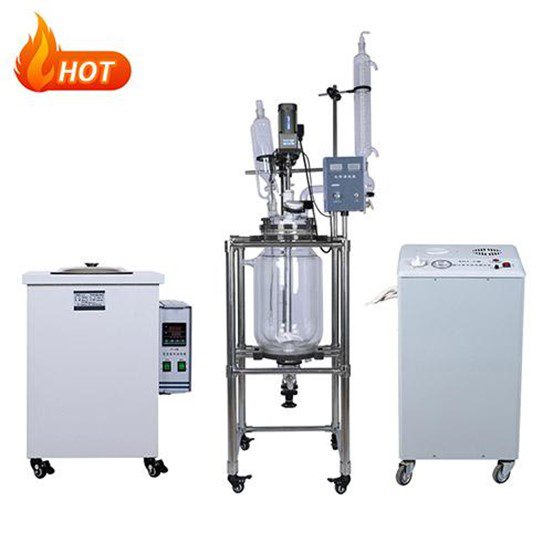How Are Glass Reactor Vessel Used in a Lab?

In the dynamic landscape of lab research, precision and innovation are paramount. Among the arsenal of tools powering scientific discovery, glass reactor vessels stand out as indispensable apparatuses for conducting a diverse array of chemical and biological processes. Their versatility, durability, and precision make them essential assets for researchers across numerous fields.
A glass reactor vessel, often simply referred to as an glass reactor is a specialized container design for conducting chemical reactions under controlled conditions. Constructed from high-quality borosilicate glass, they vessels offer exceptional resistance to chemical corrosion and thermal shock, ensuring reliability and longevity in demanding laboratory environments. Equipped with features such as stirring mechanisms, temperature control systems, and pressure regulation, glass reactor vessels provide researchers with precise control over reaction parameters, facilitating reproducibility and optimization.
Applications in Laboratory Settings:
Glass reactor vessels find widespread use in laboratory settings across a diverse range of research fields.
-
Chemical Synthesis:
In organic synthesis and chemical research, glass reactor vessels play a crucial role in conducting a variety of reactions with precision and efficiency. Researchers utilize these vessels for processes such as refluxing, distillation, and solvent extraction. The transparent nature of glass allows for real-time observation of reactions, enabling researchers to monitor progress and make adjustments as needed to optimize yields and reaction kinetics.
-
Pharmaceutical Development:
In the pharmaceutical industry, glass reactor vessels are instrumental in drug development, formulation, and process optimization. Researchers use these vessels to synthesize and characterize active pharmaceutical ingredients (APIs), conduct stability studies, and scale up production processes. The precise temperature control provided by glass reactor vessels ensures the reproducibility and consistency of pharmaceutical products, essential for regulatory compliance and quality assurance.
-
Bioprocessing and Bioengineering:
In the field of biotechnology and bioengineering, glass reactor vessels are utilized for various applications, including fermentation, enzyme production, and cell culture. These vessels provide a controlled environment for the cultivation of microorganisms, mammalian cells, and bioactive compounds. The transparent design allows researchers to visually monitor cell growth, viability, and metabolic activity, facilitating process optimization and bioprocess development.
-
Materials Science and Nanotechnology:
Glass reactor vessels play a crucial role in materials science research, enabling the synthesis and characterization of advanced materials and nanomaterials. Researchers utilize these vessels for processes such as sol-gel synthesis, hydrothermal synthesis, and chemical vapor deposition. The precise control over reaction parameters provided by glass reactor vessels allows researchers to tailor the properties and functionality of materials for applications in electronics, energy storage, and biomedical devices.
Advantages of Glass Reactor Vessels:
The advantages of glass reactor vessels contribute to their widespread adoption or popularity among researchers. Here are some key advantages:
-
Transparency and Visibility:
The transparent nature of glass reactor vessels allows for real-time observation and monitoring of reactions, providing insights into reaction kinetics, phase transitions, and product formation. Researchers can visually inspect reactions, troubleshoot issues, and optimize reaction conditions, enhancing productivity and reliability.
-
Chemical Compatibility:
Glass reactor vessels are compatible with an wide range of solvents, reagents, or reaction conditions, making them suitable for diverse applications The inert nature of borosilicate glass ensures minimal interference with reaction chemistry, preserving the integrity of products and minimizing contamination risks.
-
Thermal Stability:
Glass reactor vessels offer exceptional thermal stability, allowing for precise control over reaction temperatures. The high-quality borosilicate glass construction provides resistance to thermal shock, ensuring reliability and longevity in demanding laboratory environments.
-
Scalability:
Glass reactor vessels are designed for seamless scalability, allowing researchers to transition from laboratory-scale experimentation to larger production scales. This scalability enables researchers to optimize processes at the laboratory scale before scaling up for industrial production, ensuring consistency and quality.
Glass reactor vessels are indispensable tools for laboratory research, offering versatility, durability, and precision in conducting chemical and biological processes. Their diverse applications, coupled with advantages such as transparency, chemical compatibility, and scalability, make them invaluable assets for researchers across numerous disciplines. As scientific research continues to advance, glass reactor vessels will remain at the forefront, empowering researchers to unlock new insights and drive innovation in their respective fields.





